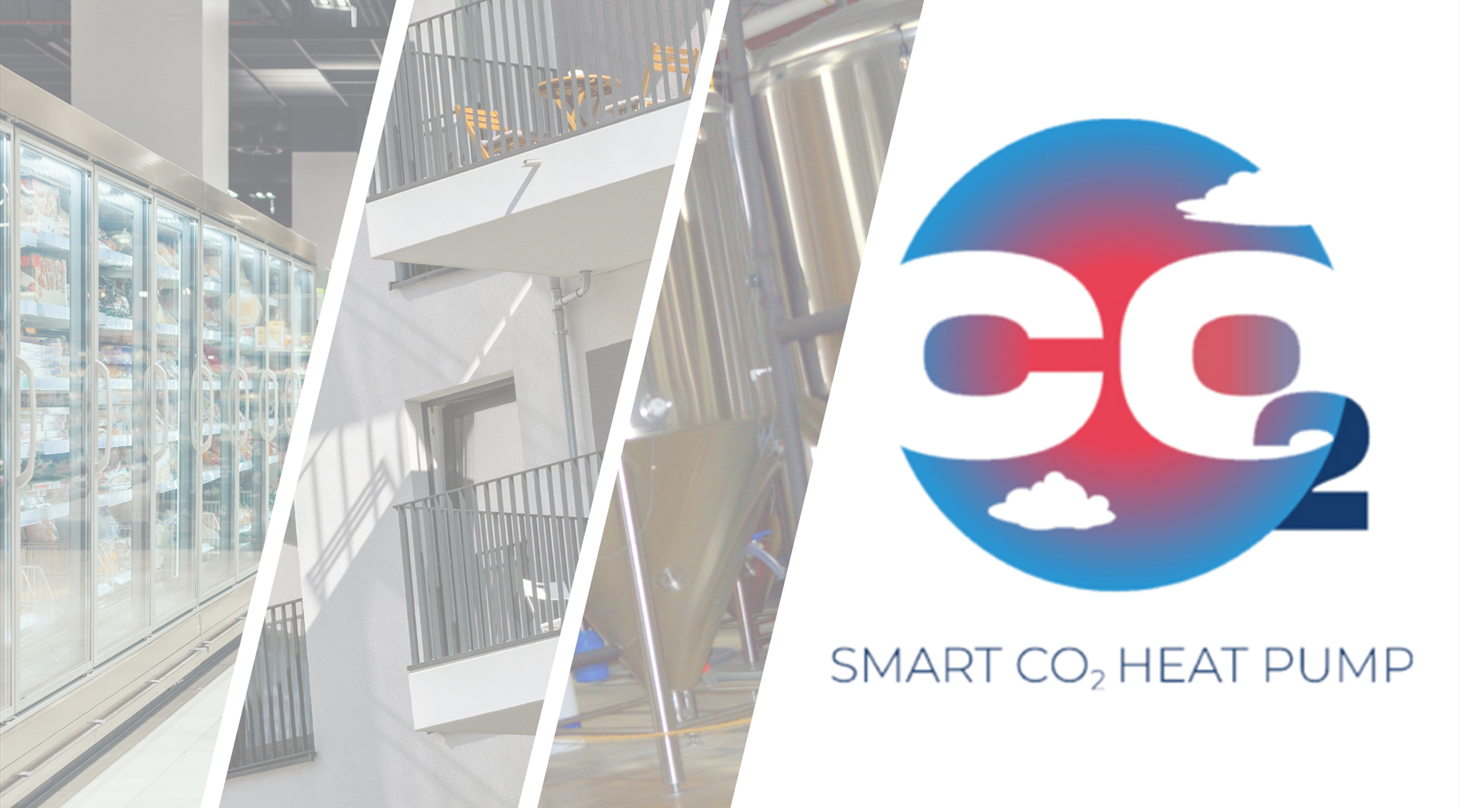.png)
CO2 heat pump project examines alternative system design for 20-200 kW installations - Newsletter from July 2025
Back to updates from the project
Since 2023, we have been participating in the Smart CO₂ Heat Pump project, which aims to develop a new heat pump concept that uses CO₂ as a refrigerant. The target of the project is systems in the 20 to 200 kW capacity range: a segment lacking non-toxic and non-flammable refrigerant options. With several million potential installations in the EU, this range represents a major opportunity, not only for new systems but also for replacing fossil fuel boilers to reduce gas dependency across residential and commercial sectors.
Existing heat pump units in this capacity segment often use HFO refrigerants, which have raised concerns regarding efficiency, environmental impact, flammability, and their potential contribution to TFA and PFAS pollution. CO₂ is considered as a safer and more natural alternative. The project aims to explore whether a CO₂-based solution can address these issues while offering competitive energy efficiency and pricing.
It is not viable to simply scale down large CO₂ systems as smaller installations demand a significantly different cost structure and design approach. This drives the need for entirely new technical solutions, including a novel refrigerant cycle and custom-designed components.
Among these are modulating ejectors, expanders, frameless high-pressure plate heat exchangers, and a newly designed evaporator optimized for cold gas defrost. Cold gas defrost represents the most efficient method for removing frost from the heat pump, as it allows the refrigerant cycle to remain active during defrost.
An equally important aspect is the water side, which includes storage tanks and the associated management system provided by Danfoss. This setup ensures that the supply of heat to end users remains uninterrupted during defrost cycles, since stored thermal energy can be delivered even when the heat pump itself is briefly focused on defrosting. In this way, the water side maintains thermal comfort and efficiency for the user, while cold gas defrost optimizes the defrosting process.
In addition to performance and price, the solution must also meet practical requirements such as being robust, easy to install ("plug and play"), and highly service-friendly. These are crucial factors in the target markets, which include multifamily buildings and smaller commercial or public facilities.
We appreciate the opportunity to be involved in the project and aim to contribute to the development of energy solutions that support increased efficiency and benefit society. Our work includes project management and testing, and we also support the transition to more efficient technologies by collaborating closely with partners to achieve shared goals.
As project manager, our goal is to ensure precise testing and research throughout the project. By working closely with partners from industry and academia, we focus on developing and evaluating solutions within heat accumulation and refrigeration technologies. Through this collaboration, we seek to support ongoing efforts to improve energy efficiency and support progress within the energy sector in Danish society
- Jˇhannes Kristˇfersson, Senior Project Manager, Danish Technological Institute
Why follow the progress of the project?
The Smart CO₂ Heat Pump Project explores practical approaches to modernizing energy systems. The project examines plug-and-play solutions intended to simplify installation and maintenance, potentially minimizing downtime. It also considers how such technologies can contribute to reduced reliance on fossil fuels and improved energy efficiency. Efficient electric heat pumps are being assessed for their ability to lower operating costs, decrease dependence on gas, and offer greater flexibility in energy supply.
Below you can read more about the smart monitoring and application opportunities, and the collaboration shaping the Smart CO2 Heat Pump Project. If you have any questions, please contact Jˇhannes Kristˇfersson.
Smart monitoring and application potential
A central innovation in the project is cloud-based monitoring. By linking the heat pump to an online platform, it becomes possible to monitor real-time performance, detect faults, maintain operation despite component issues, and optimize performance based on electricity prices via control algorithms.
The heat pump is intended for use in multifamily buildings, small production facilities, retail and service spaces, and public institutions; locations where efficiency, simple installation, and ease of service are crucial. The system demonstrates a COP estimated between 3 and 5 under specified conditions, with technical data available upon request for clarity. Preliminary studies indicate up to a 31.4 % improvement in performance at full load compared to traditional HFO-based units, with findings supported by initial data analysis.
Collaboration across the value chain
The project started in January 2023 and runs for three years. It is a collaboration between Danish Technological Institute and a consortium of partners consisting of Fenagy, Bitzer Electronics, Danfoss, Kelvion, LU-VE, Salling Group, CO2X, Aarhus University, and Reftronix, with funding from the EUDP. This project consortium brings expertise from across the value chain with the aim of developing a robust, efficient, and practically applicable solution which contributes to the transition towards greener heating technologies in Europe.
Contact
Jˇhannes Kristˇfersson
Senior Project Manager at Danish Technological Institute
- and project manager for the Smart CO₂ Heat Pump Project.
Feel free to reach out to him if you have any questions about the project or want to know more about industrial refrigeration systems and heat pumps using, e.g., CO₂, R717 and HC as refrigerants.